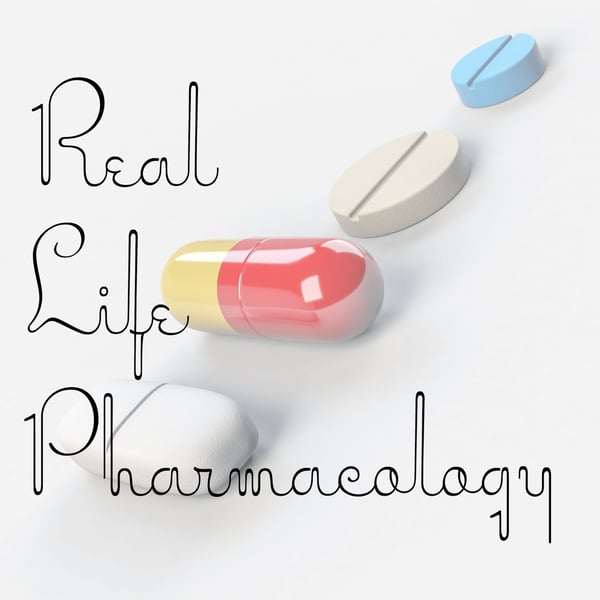Acamprosate Pharmacology Podcast – Episode 306
Real Life Pharmacology - Pharmacology Education for Health Care Professionals
Eric Christianson, PharmD; Pharmacology Expert and Clinical Pharmacist
5 • 716 Ratings
🗓️ 21 December 2023
⏱️ 11 minutes
🧾️ Download transcript
Summary
Acamprosate's most common adverse effect is diarrhea. It is a primary reason why patients will ask to stop taking this medication.
It is critical to assess renal function prior to using acamprosate. Dose adjustments are recommended when patients have a CrCl of less than 50 ml/min.
Unlike naltrexone, acamprosate avoids liver metabolism making it an alternative option in alcohol use disorder for patients who have liver impairment.
Transcript
Click on a timestamp to play from that location
| 0:00.0 | Hey, all, welcome back to the Real Life Pharmacology podcast. I'm your host, pharmacist, Derek Christensen. |
| 0:05.6 | Thank you so much for listening today. As always, go check out Real Life Pharmacology.com. We've got your free 31 page PDF. |
| 0:13.9 | It's a little study guide I put together on the top 200 drugs. It's a great no-brainer. |
| 0:18.7 | If you're going through pharmacology classes or just need a little |
| 0:22.5 | refresher and you're out in regular practice. So go take advantage of that, simply an email. We'll get |
| 0:29.3 | you access to that, no charge to you at all. So with that said, let's get into the drug of the day |
| 0:36.2 | today. And that is a camprosate. |
| 0:40.3 | Brand name in this medication is campril, and this medication is used for alcohol use disorder. |
| 0:49.4 | So basically trying to reduce intake of alcohol in people that have struggled with that issue. |
| 0:57.4 | So this medication mechanistically works by basically stimulating or increasing GABA effects |
| 1:08.7 | and or reducing glutamate effects. |
| 1:12.9 | So if you remember, GABA is kind of that suppressing central nervous system molecule. |
| 1:21.8 | And glutamate is more of an excitatory neurotransmitter. |
| 1:26.0 | So GABA agonist action would obviously kind of drop down or blunt that central nervous system. |
| 1:35.3 | And then glutamate antagonist activity would also work to blunt kind of that central nervous system by blocking that excitatory neurotransmitter. |
| 1:48.3 | Now, how exactly this all works and this mechanism works in alcohol use disorder isn't well defined, |
| 1:56.0 | but that's essentially what the medication does in general. |
| 2:01.9 | So again, mechanism of action, not that well understood, |
| 2:06.0 | but certainly has been shown in studies to help maintain alcohol abstinence. |
| 2:13.8 | It is important to note, so with alcohol use disorder historically, many, many years ago, |
| 2:20.3 | we used to use dysulfram a little bit more, and basically that would cause a reaction if they |
| 2:28.3 | patient drank alcohol, so basically a negative feedback type situation where the patients would feel terrible if they |
... |
Please login to see the full transcript.
Disclaimer: The podcast and artwork embedded on this page are from Eric Christianson, PharmD; Pharmacology Expert and Clinical Pharmacist, and are the property of its owner and not affiliated with or endorsed by Tapesearch.
Generated transcripts are the property of Eric Christianson, PharmD; Pharmacology Expert and Clinical Pharmacist and are distributed freely under the Fair Use doctrine. Transcripts generated by Tapesearch are not guaranteed to be accurate.
Copyright © Tapesearch 2025.

